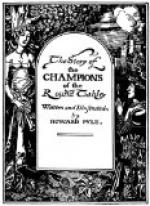So they all reached Ireland in safety, and, because Sir Tristram had aided the King of Ireland in the day of his extremity, the Queen forgave him all the despite she held against him, so that he was received at the court of the King and Queen with great friendship and high honor.
[Sidenote: How Sir Tristram dwelt in Ireland] For a while Sir Tristram dwelt in Ireland and said nothing concerning that purpose for which he had come. Then one day he said to King Angus: “Lord, thou art not to forget to fulfil that promise which thou madst to me concerning the Lady Belle Isoult.”
To this King Angus made reply: “I had hoped that now we were come to Ireland you had changed your purpose in that matter. Are you yet of the same mind as when you first spake to me?”
“Yea,” said Sir Tristram, “for it cannot be otherwise.”
“Well, then,” said King Angus, “I shall go to prepare my daughter for this ill-hap that is to befall her, though indeed it doth go against my heart to do such a thing. After I have first spoken to her, you are to take the matter into your own hands, for, to tell you the truth, I have not the heart to contrive it further.”
So King Angus went away from where Sir Tristram was, and he was gone a long while. When he returned he said: “Sir, go you that way and the Lady Belle Isoult will see you.”
So Sir Tristram went in the direction King Angus had said, and a page showed him the way. So by and by he came to where the Lady Belle Isoult was, and it was a great chamber in a certain tower of the castle and high up Under the eaves of the roof.
[Sidenote: How Lady Belle Isoult appeared to Sir Tristram] The Lady Belle Isoult stood upon the farther side of this chamber so that the light from the windows shone full upon her face, and Sir Tristram perceived that she was extraordinarily beautiful, and rather like to a shining spirit than to a lady of flesh and blood. For she was clad altogether in white and her face was like to wax for whiteness and clearness, and she wore ornaments of gold set with shining stones of divers colors about her neck and about her arms so that they glistered with a wonderful lustre. Her eyes shone very bright and clear like one with a fever, and Sir Tristram beheld that there were channels of tears upon her face and several tears stood upon her white cheeks like to shining jewels hanging suspended there.
So, for a while, Sir Tristram stood still without speaking and regarded her from afar. Then after a while she spake and said, “Sir, what is this you have done?” “Lady,” he said, “I have done what God set me to do, though I would rather die than do it.”
She said, “Tristram, you have betrayed me.” Upon the which he cried out in a very loud and piercing voice, “Lady, say not so!”
She said: “Tristram, tell me, is it better to fulfil this pledge you have made, knowing that in so doing you sacrifice both my happiness and your happiness to satisfy your pride of honor; or is it better that you sacrifice your pride and break this promise so that we may both be happy? Tristram, I beseech you to break this promise you have made and let us be happy together.”




